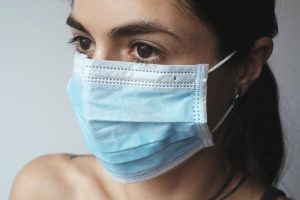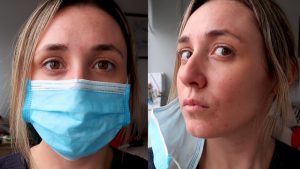The ongoing corona-virus crisis has impacted our daily lives in numerous ways as we take steps towards coping with the new ‘normal.’ In these unprecedented times, surgical masks play a vital role in protection from the spread of the virus in public places. However, prolonged use presents with undesirable and uncomfortable side effects to the skin.
Have you seen the news stories and the social media feeds filled with images of health care workers dealing with skin issues from wearing medical-grade masks hours on end?
Although not to the same extent as front line workers, wearing a face mask, for some, causes discomfort resulting in flare ups of preexisting conditions.
Our skin is an active organ with the full time job of continually regenerating and producing the necessary moisture. Like a seesaw, our skin is in a state of equilibrium with the outside air. Changes in ambient humidity, either too dry or too humid, can trigger skin conditions in predisposed individuals.
Protecting your face with a mask becomes difficult in moments when a blend of trapped breath, sweat and skin oils act synergistically to create a hot and moist environment for bacterial to grow. This leads to inflammation, rashes and acne breakouts.
’Maskne’: Why Your Face Is Breaking Out Under Your Mask?
Physical manipulation, pressure of the mask, occlusion and emotional stress combine to make the perfect recipe for acne.
 The face is not accustomed to having something cover the nose and mouth for long periods. In areas that are covered, the skin experiences more friction than normal. This often leads to greater irritation, sores and cuts. Broken skin acts as a portal for infection.
The face is not accustomed to having something cover the nose and mouth for long periods. In areas that are covered, the skin experiences more friction than normal. This often leads to greater irritation, sores and cuts. Broken skin acts as a portal for infection.
If you are prone to acne, wearing a mask can exasperate it, cause breakout, more inflamed spots and worsen severe eczema.
According to Dr. Maria Khattar, a leading medical aesthetics expert and trainer, “The constant contact and friction caused by prolonged contact of the skin by a mask can lead to a form of acne known as Acne Mechanica coverings.”
‘Maskne’: How To Prevent?
One of the main causes of acne form lesions is the clogging of pores with a combination of keratinoyctes (dead cells) and sebum in combination with proliferation of our skin’s resident bacteria, Propionibacterium Acnes (P.Acnes.)
A daily regimen of twice daily cleansing with a dermatological cleanser of neutral pH and a nightly use of exfoliating agent, such as an alpha hydroxy acid or retinoic acid product can prevent the formation of acne. When using exfoliating agents, diligent sun protection during the day using sunscreens is imperative.
If the condition progresses to moderate or severe acne, several professional energy based treatments (of lasers and lights) can effectively treat the condition.
Few studies demonstrate that Platelet Rich Plasma (PRP) can accelerate the healing process, regulate inflammation by inhibition P. Acnes. The mechanism of action of PRP involves the release of powerful antimicrobial peptides from the platelets’ alpha granules.
Read about how to care of patients’ skin while wearing a mask.
Other Skin Conditions To Look Out For
Mask wearing can lead to alterations in the skin microbiome. The covered skin is subject to elevated CO2 levels, increased humidity, high temperatures and more micro-organisms. When vapour, saliva, sweat and moisture gets stuck between mask and skin, it leads to clinical manifestations such as rashes, redness and scaling in those areas.
Millaria, also known as heat rash, and itchy rashes, termed contact dermatitis, can also occur. Hot and humid temperatures can flare red pimples and blood vessels on your cheeks and nose resulting in Rosacea.
 Chronic inflammatory disease that results from skin barrier dysfunction and overall local immune response and hypersensitive nerves around the blood vessels causing them to widen persistently result in chronic facial redness. Hives, an allergic skin reaction, may occur which causes itchy, swollen-pale red bumps on our skin with burning or stingy pain. Excessively dry skin, resolving rashes and repetitive friction can cause changes in pigmentation.
Chronic inflammatory disease that results from skin barrier dysfunction and overall local immune response and hypersensitive nerves around the blood vessels causing them to widen persistently result in chronic facial redness. Hives, an allergic skin reaction, may occur which causes itchy, swollen-pale red bumps on our skin with burning or stingy pain. Excessively dry skin, resolving rashes and repetitive friction can cause changes in pigmentation.
Skin is your greatest treasure. Uncomfortable lesions, new blemishes, an itchy rash, an abrasion or a wound should always be looked into by a dermatologist.
